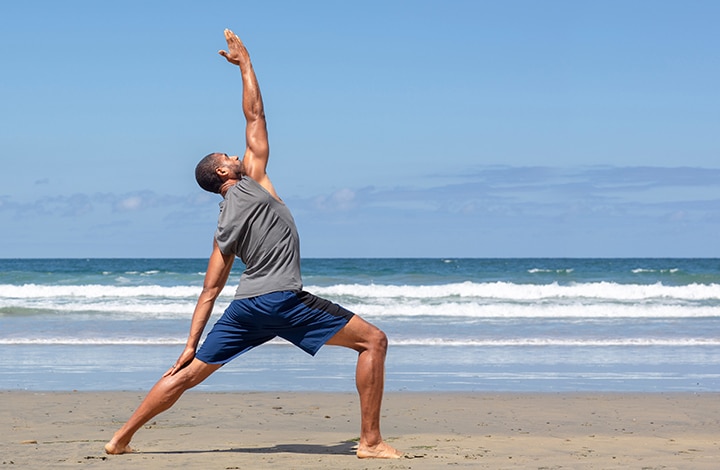Yoga for Addiction Recovery
Overcoming addiction is a challenging journey, but yoga for addiction recovery could be the path for you. Find out more about this approach at Harmony Ridge Recovery Center.
Battling addiction is not easy, but if you are looking to treat your condition, yoga for addiction recovery may be the route for you. Like yoga, recovery from any disorder can have more than one path. Finding the right direction for you is the key to overcoming your addiction and achieving overall mental well-being.

Several years ago, studies by the National Survey Drug Use and Health showed that an estimated 21.4 million people in America who were 12 years old and above struggle with some form of substance abuse. That equates to about 1 in 12 American adults. Addiction is a significant problem in the U.S. and has caused family members to lose loved ones.
Substance abuse disorders have cost Americans over $740 billion annually. As a result, there was an increase in campaigns against substance abuse, along with suggested treatments that can help. Holistic methods like yoga and meditation have become increasingly valuable treatments as a complementary method in addition to traditional medications.
What is Yoga?
Yoga is a mind and body practice rooted in Indian philosophy that goes back about 5,000 years. It’s an ancient and complicated practice that originated as a spiritual one and later developed popularity in promoting physical and mental well being. There are many different types of yoga and a multitude of disciplines within the practice. The classic form of yoga has other elements; however, its practices in the U.S. focus on physical postures (asanas), breathing techniques (pranayama), and meditation (dyana). A couple of yoga styles that focus on these elements are iyenga and hatha.
Iyenga
Iyenga is the practice of precision. This practice focuses on anatomical details and the alignment of each posture. Individuals practicing iyenga hold poses for long periods and often modify these positions with props. The iyenga method cultivates strength, flexibility, stability, and awareness. It can also be therapeutic for certain conditions.
Hatha
Hatha is the category of yoga for most forms practiced by yogis and yoginis in the West. This discipline refers to the practice of physical yoga postures. The hatha yoga method helps to align and relax the body, mind, and spirit for meditation.
We often see yoga promoted to achieve physical fitness, but historically yoga didn’t focus on exercise and meditation. Although yoga is known for its postures and poses, these were not an essential part of India’s original yoga traditions. Fitness was not the ultimate goal. Instead, the focus was on expanding spiritual energy by using breathing techniques and mental focus.
Male and female yoga practitioners, yogis and yoginis, practiced and taught yoga long before there was a written account of the discipline. Over time, yoga schools developed as the practice spread across the globe, expanding its reach and popularity. The yoga tradition gained popularity in the West towards the end of the 19th century. Postural yoga became hugely popular in the 1920s and 1930s, first in India and later in the West.
Benefits of Yoga for Addiction Recovery
Yoga has a wide variety of benefits for the mind and body for those who choose to practice it. Practitioners can experience enhanced recovery treatment for addiction. Research suggests many benefits from practicing yoga for physical and mental well-being. Treating your addiction involves taking care of your body and mind.
Physical Benefits
Some physical benefits of yoga may include:
- Increased flexibility
- Improved muscles strength and tone
- Maintaining a balanced metabolism and weight reduction
- Cardio and circulatory health
- Increased respiration, energy, and vitality
- Prevention of cartilage and joint breakdown
Mental Benefits
Your mental health is crucial in addiction recovery, and you may get some of the following mental benefits by practicing yoga:
- Stress management
- Emotional stability
- Increased calmness and mindfulness
- Better sleep
- Balance and general wellness
- Self-discipline
Popular Yoga Practices
There is no right or wrong way to practice yoga. It can take a few tries to find the right yoga practice that is a good fit for you. If you don’t like your first attempt at yoga, that doesn’t mean it isn’t for you. When starting yoga, a best practice is to take a class for beginners or a course that offers basic instructions for an amateur. There are a multitude of ways to practice yoga. Current practices involve four primary types:
Karma
Karma is the path of service by performing selfless acts for the good of others. Unconditional service is a tradition in Hindu monasteries, and many yoga training programs require participants to practice karma yoga by performing activities like cooking, cleaning, and volunteering to serve others.
Bhakti
Bhakti practitioners express their love of the Divine through devotional rituals. The rituals can include regular prayer, chanting, singing, dancing, and celebration.
Jnana
Jnana is the path of intellect and wisdom. Its factors include the study of sacred texts, intellectual debates, philosophical discussions, and introspection.
Raja
Raja is known as the “royal path,” which leads its practitioners to personal enlightenment. This particular path balances the previous three main yoga types of karma, bhakti, and jnana.
Yoga for Addiction Recovery and Treatment
There are many options to treat addiction and substance abuse that ranges from traditional to alternative to complementary methods. Treatment programs have started to focus more on a holistic approach treating the whole person with a magnitude of methods and tools to enhance and assist with recovery.
Yoga for addiction recovery should be viewed as an adjunct health practice that is a natural form of medicine. It can help treat addiction, but it’s meant to be used in tandem with other traditional substance abuse treatment strategies.
Yoga and meditation are seen as a path to release physical and emotional pain because it introduces routine and breathing to the mind and body. Yogic practices have different beliefs about substance abuse. These yoga principles follow the concept that drugs interfere with consciousness and disturb the body’s energy centers, producing toxins.
The traits of yoga help those suffering from substance abuse as its origins focus on centering and grounding the mind. Practicing yoga for addiction recovery creates a sense of ease and connection despite the highs of excitement and lows of depression. When taking deep breaths, a person starts to feel endorphins or “feel-good hormones” that causes a natural high in the brain. This raw feeling of euphoria, in addition to the calming and balancing benefits of yoga, can have a profound effect on an individual going through addiction recovery.
The Benefits of Yoga for Mental Health
Yoga therapy for mental health can be successful due to its basic philosophy that the mind and body are integrated and not treated separately. You can work on your mental health via targeted yoga practices in the body and vice versa.
Applying a tool or strategy in one particular area can benefit a completely different part of the body or mind. A mental health professional can instruct a client to practice a specific breathing technique to address a physical ailment like chronic asthma. By doing this technique over time, the client may see an improvement in their ability to manage anxiety issues.
Addiction treatment will involve addressing the effects addiction has on the physical body, but treating the mind and an individual’s mental health will also be an essential component.
Get Help Today at Harmony Ridge
If you’re struggling with addiction, there are treatment options available to you. Recovering from any condition like addiction starts the minute you pick up the phone and ask for help. Harmony Ridge Recovery Center has a unique approach to addiction treatment. We use evidence-based addiction treatment and a comprehensive-holistic system that includes methods like yoga and meditation. Our recovery center has an experienced team of licensed medical professionals, administrative staff, and management ready to serve you.
References:
https://www.nccih.nih.gov/health/yoga-what-you-need-to-know
https://www.medicalnewstoday.com/articles/286745
https://www.yogajournal.com/yoga-101/types-of-yoga/iyengar
https://www.yogajournal.com/yoga-101/types-of-yoga/hatha
https://osteopathic.org/what-is-osteopathic-medicine/benefits-of-yoga/
https://yogamedicine.com/guide-types-yoga-styles/
https://www.verywellfit.com/types-of-yoga-cheat-sheet-3566894
https://us.humankinetics.com/blogs/excerpt/the-four-primary-types-of-yoga
https://yogatherapy.health/how-can-yoga-therapy-help/mental-health/
Jump To Section
Begin Your Journey to Healing Here
Reach Out For Help
Our recovery specialists are standing by 24/7 to help you or your loved one.
Or call us: 



